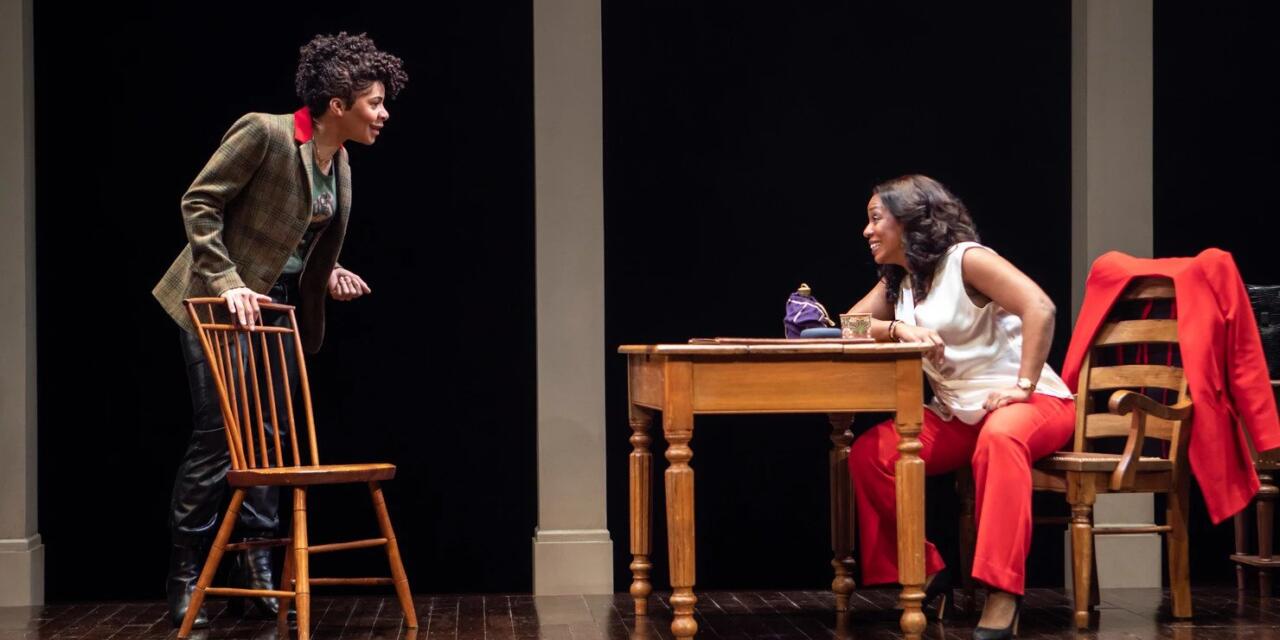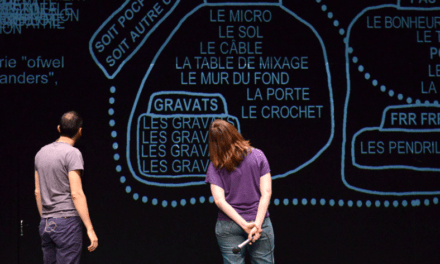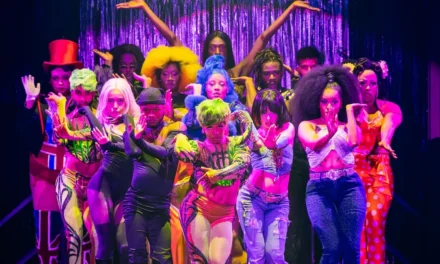Dominique Morisseau is aware that most of her fans see her as a predominantly naturalistic playwright with a sharp comic tongue and a sharper social conscience. She says so in an intro note to her wonderful new play Confederates, hoping to complicate that neat picture. Confederates is a broad and whimsical satire that leaps back and forth between time lines a century and half apart and leaves you wondering where this madcap side of her has been hiding all this time. This play doesn’t bother much with naturalism, as its main business is turning chuckles into clarifying anger about the dubious alliances Black women have endured in their long struggle for self-reliance, justice and dignity.
Satire is a very tricky form. For one thing, it always plays to some people who just don’t get it, no matter how sharp it is. Secondly, it always runs the risk that its humor will be spoiled by too much contempt, because satirical authors are by definition driven by indignation. Audiences won’t laugh very long, or truly care, at clever ridicule alone, so good satires have to open out beyond the fools and scoundrels they’re lambasting. They have to adjust their canvas to work as a mirror that reflects broader absurdities and flaws that the author owns herself. Morisseau, to her enormous credit, sees this, and it’s what makes Confederates touching as well as acerbic and clever.
The play begins with a complaint about a racially charged prank. Sandra, a Black political science professor at a contemporary private college, searingly played by Michelle Wilson, enters in a bright red power suit and displays a slide of a slave woman, breasts exposed, suckling a white baby. Someone has posted this picture on her office door with Sandra’s face photoshopped over the slave’s, and she is demanding an investigation. She is “not averse to images of slavery,” she says, as she analyzes them in her classes. Nor does she really understand the joke, or taunt, or insult, or whatever it was.
Interestingly enough, she couches her reaction in an exasperated display of knowledge that also seems to be the cultural context in which Morisseau sees her own play. Sandra ticks off a formidable list of dozens of books, exhibitions, plays and films about slavery she’s read and seen over the years, from older works like Jubilee, Roots and Birth of a Nation to recent headliners like Slave Play, An Octoroon and Django Unchained. It occurred to me, listening to this list, that beginning a new play by name-checking rivals is pretty risky stuff (none of the named works is ever referenced again). Yet by the end, I saw a point in it: highlighting that none of those major past works adequately covered the same territory as Confederates, which is the minefield of unreliable “friends” that capable Black women have to negotiate as they strive to rise in the world.

Photos by Monique Carboni.
Confederates proceeds on two tracks over 90 intermissionless minutes, tightly directed by Stori Ayers to keep its tone light and farcical even when dealing with grim details of slavery and oppression. Sandra’s story is intercut with that of a bright and anachronistically sassy slave named Sara, played with hilarious, tightly wound tenacity by Kristolyn Lloyd, who is recruited as a Union spy during the Civil War.
Sara wants to run away and fight the Confederacy with guns alongside her runaway brother Abner, a Union soldier who periodically returns to the plantation on reconnaissance missions. Abner discourages that, stressing her safety though it’s clear he’s threatened by her toughness and all-around competence. Enter Missy Sue, the master’s pushy daughter who illegally taught Sara to read and considers her a “friend.” She’s recently returned from a failed marriage up north and exposure to liberal ideas. Missy Sue puts Sara to work in the house so she can steal war information from her father’s office. Is this a trap to catch Abner when he picks up the info from Sara? Sara can’t know.
Enter also the house slave Sara displaced, LuAnne, who is forced to share the master’s bed and who knows something’s fishy with Sara’s new assignment. Since snitches are handsomely rewarded in this world, how could Sara possibly confide in LuAnne? Meanwhile Missy Sue has made clear she wants Sara in her bed. The big picture here is that Sara is prevented from simply seizing her freedom because she has to use all her wit and cunning to protect herself from real and potential treachery by her purported friends.
That’s the same picture that emerges from Sandra’s story—which is played with the same superb supporting cast, the actors dashing to and fro while briskly exchanging tear-away costumes. Elijah Jones, who plays Abner, doubles as Malik, an intense Black student Sandra likes and tries to help but who insists on looking for bias in everything she says. Kenzie Ross (Missy Sue) becomes Candice, Sandra’s white personal assistant, a self-involved, well-meaning twit who constantly blunders into casual racism and imagines a deep bond with Sandra simply because both recently went through breakups. Andrea Patterson (LuAnne) doubles as Jade, Sandra’s Black, untenured junior colleague who claims to idolize her but who drops by to guilt-trip her aggressively about her own upcoming tenure case. (This is the play’s one false note, as no real junior professor would ever be so rash.)
I fear I haven’t made sufficiently clear how funny Confederates is. The script is rife with quips and zingers that have the audience almost constantly tittering and that drive home the politically tinged humor much more effectively than grim seriousness ever could. Yet the core strength of the work lies in Morisseau’s serious perception that Sandra and Sara’s stories, 160 years apart, illuminate one another. Both represent the cream of Black potential thwarted by comparable failures of solidarity.
In a word, both women are surrounded by “confederates” rather than true supporters or friends, and that forces them to squander their creative energies in clever maneuvers of self-protection. This satirical farce, then, is really a kind of tragicomedy. The answer to the mystery of who posted the photoshopped picture—which I won’t reveal—is a fittingly ambiguous coda to it. You can tell that Morisseau probably wanted to end on an upbeat note but couldn’t figure out how, other than to have Sara and Sandra look at one another for the first time. Everyone in the play, it turns out, is both guilty and innocent. You’ll have to go see it to understand what I mean.
Confederates
By Dominique Morisseau
Directed by Stori Ayers
Signature Theatre
This article was originally published by Jonathan Kalb on Mar 28, 2022, and has been reposted with permission. To read the original article, click here.
This post was written by the author in their personal capacity.The opinions expressed in this article are the author’s own and do not reflect the view of The Theatre Times, their staff or collaborators.
This post was written by Jonathan Kalb.
The views expressed here belong to the author and do not necessarily reflect our views and opinions.


















